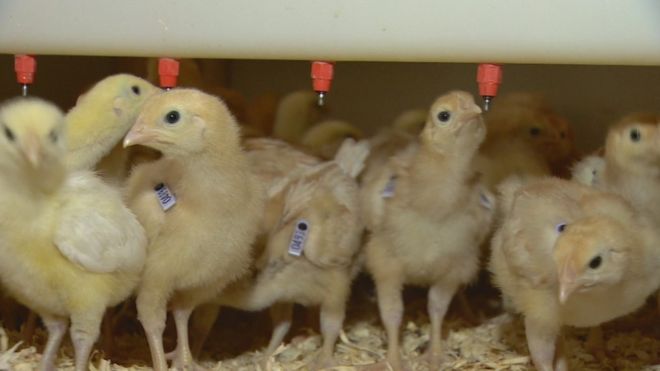 New generations of genetically-modified chickens are being bred at the research centre
New generations of genetically-modified chickens are being bred at the research centre
Researchers at the University of Edinburgh's Roslin Institute have genetically modified chickens to produce human proteins in their eggs.
They hope the project will one day lead to lifesaving drugs that are much cheaper to make.
The team modified the genomes of the chickens so their eggs contain large amounts of high quality proteins.
Just three eggs contain a clinically significant dose, according to the scientists.
Initially the proteins will be used in research but laboratory tests have already found they work at least as well as equivalent drugs.
Protein-based therapies such as the cancer treatments Herceptin and Avastin can be effective where traditional drugs fail but they are highly expensive.
The new research - a collaboration between the institute and the university's spinout company Roslin Technologies - holds out the promise of a far cheaper production process.
We meet the medicine makers of tomorrow in a secure facility at the Institute.
Dozens of transgenic chickens are kept in rows of spacious pens.
Their job is straightforward enough: lay 300 eggs a year.
There are cockerels here too, something of a surprise to a townie like me.
Their purpose is twofold. Hens won't lay unless there's a cockerel in the vicinity.
Plus the males are required to make more transgenic chickens.
These creatures are not clones. New generations of protein producers are made in the conventional, biological way.
Professor Helen Sang of the Institute says it's a cost effective way of scaling up production:
"If you want more eggs you just need more birds."
"That's why in this pen we have a cockerel - and he can produce an awful lot of children in a short time.
"So we can produce a lot of hens in a short period if we want to bulk up the supply of the drug."
In a laboratory away from the cacophony of the chicken shed, Dr Lissa Herron of Roslin Technologies produces a tray of brown eggs that would grace any breakfast table
But these ones will never enter the food chain. "It's quite old fashioned initially," she says.
"We just crack the egg. I've become quite adept at cracking eggs over the years."
The golden yolk is put to one side unneeded.
It's the egg white that contains the treasure: large quantities of medically important proteins.
"These proteins are really, really expensive to produce," she says, "because you can't just synthesise them in a chemistry lab.
"You need a living system to manufacture them because proteins are very large molecules, very complex and they need all of the machinery of a cell to make them and fold them properly."
So far the the chickens have been genetically modified to produce two types of protein.
One is Macrophage-CSF. It is being is being developed as a therapy that stimulates damaged tissues to repair themselves.
It is being produced in human and pig versions.
The other is called Interferon Alfa-2A.
"This is a human protein that is native in our bodies - it's expressed as part of our immune system," Dr Herron says.
"It has antiviral properties. It's also been found that is has some anti-cancer properties.
"It's a protein that is used in the clinic today - or has been for quite some time - for treating hepatitis and certain cancers."
As with all research into promising treatments there is a caveat. It can take decades of further research and testing before a breakthrough becomes a medicine.
However treatments for rare, so-called 'orphan' diseases can be fast-tracked - and drugs for animals tend to come on the market even more quickly.
By reducing the cost of protein therapies the new technique could create affordable treatments for farm animals and pets, opening up a new market in the veterinary sector.
Dr Herron knows just how effective protein therapies can be: she received an existing drug for inflammatory bowel disease.
"It was a pretty incredible thing," she says. "I went from Friday, when I was probably going to have my entire bowel removed, to Monday going home.
"It's pretty impressive type of stuff we can do with some of these drugs.
"So hopefully we can get these out there and treat some of these really difficult illnesses."
The team are confident they can expand the range of proteins chickens can lay.
The technique used to introduce the new genes into chicken DNA employed a lentivirus to deliver the payload.
It is long established but involves trial and error before the genes find their desired target.
The newer CRISPR/Cas method is expected to allow much more precise editing.
The researchers received strategic funding from the Biotechnology and Biological Sciences Research Council and published their findings in the journal BMC Biotechnology.
The chickens themselves are unaffected by the presence of human proteins in their systems.
Living in conditions superior to those of battery hens, they just go on laying eggs as normal.
EU regulations against GM organisms in the food chain mean neither they nor their eggs will end up on your plate.
But they could be pioneers in producing better and cheaper medicines.
Cheaper because they literally work for chicken feed.
By Kenneth Macdonald, BBC Scotland special correspondent